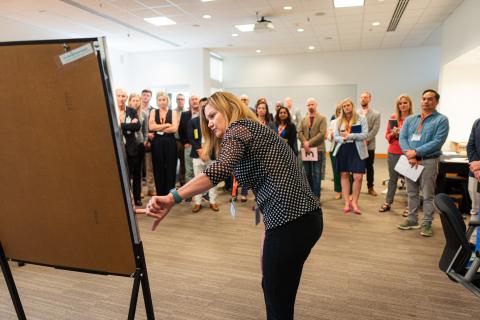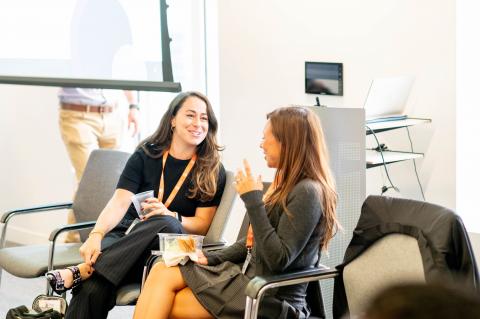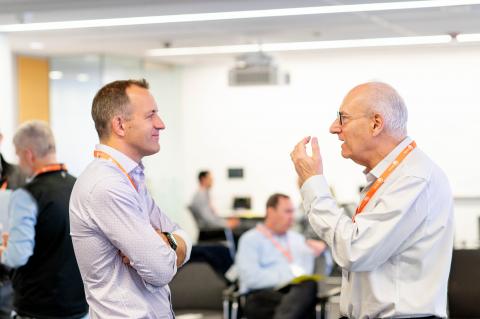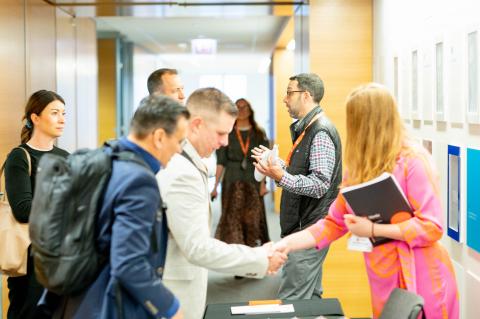Submitted by networkadmin on
Where should you concentrate your efforts as a Global Head of Learning?
In the first of iVentiv’s ‘Five minutes with’ series, Charles Jennings, Co-Founder of the 70:20:10 Institute and a member of the iVentiv Advisory Board, spoke about the key skills and challenges that CLOs need to focus on right now.
What one skill should CLOs be working on right now?
“If I had to just pick one skill or capability or attribute that CLOs should be working on right now,” Charles says, “I think it would be communityship”.
What is communityship?
“Communityship” was a term first coined by Henry Mintzberg, and Charles explains that it represents the need for leaders to demonstrate the right leadership qualities to create a collective sense of purpose. That’s especially important in today’s changing environment.
“Everyone's going to have to adopt new approaches to deliver greatest business value” Charles says. “We don't need heroic leaders, we actually we need CLOs who march with their teams rather than stand out the front of their teams.”
Communityship becomes part of a company culture, Charles explains. “Mintzberg always says you can recognize communityship when you walk into an organisation and you're struck by the energy in the place and struck by the personal commitment of everyone and their collective engagement in what they're doing.”
If there’s one skill or attribute you should be working on, then, communityship is a great place to start.
What are the key challenges facing CLOs?
Charles also picked out two key challenges that CLOs are facing right now and explained how he thinks L&D leaders can address them. Those challenges are:
1) Expanding learning solutions beyond formal learning programmes
2) Demonstrating the business impact or Learning and Development
How can CLOs expand the learning solutions they offer?
It’s imperative, Charles says, that CLOs expand and extend the learning solutions that they and their teams develop.
“This means looking beyond formal learning, looking beyond courses and e-learning and programs and everything built around formal learning. And I think it means building capabilities to develop high-quality performance support solutions” Charles says.
“It means working out how to collaborate with colleagues, particularly colleagues in the quality and performance improvement teams and other teams in organisations. It means collaborating and co-creating with stakeholders so they're not just serving up solutions to stakeholders with bows on top, that stakeholders have some skin in the game. It means getting closer to the root of organisational problems and opportunities and carrying out proper performance analysis rather than just learning analysis, looking at the whole root cause of any challenge or opportunity that they're facing.”
Perhaps most importantly, Charles argues that CLOs and their organisations need to embrace the fact that the majority of learning takes place as part of daily work, rather than in the training room. The challenge then is “working out how to harness that and to accelerate learning at an organisation level, at a team level, and an individual level, probably in that order.”
How can Heads of Learning demonstrate ROI?
The second challenge that Charles highlights is demonstrating business impact and ROI. “This has been on the CLO agenda for as long as I can remember and many CLOs really haven't cracked it,” he says.
What does Charles suggest? “Demonstrating business value is all about working really closely with stakeholders so they're part of the solution not just part of the problem.”
“It's also about addressing problems in an holistic way,” he says. Use tools such as business canvasses, and don’t assume that a bit of technology is going to make all the difference, or that L&D upskilling is the entire solution.
“It's about stepping back and saying actually we're dealing in complex environments and we've got to look at it from every direction to find the best solutions. Of course individual things can have an impact but just focusing on one or two dimensions is not going to lead to success. The challenge of measuring business value or demonstrating business value is all tied up with working closely with stakeholders deciding the metrics they use and they measure success on and what their measures of success are rather than creating our own L&D metrics.”
Working together with stakeholders to focus on their measures of success, though, requires a different approach to that which a lot of Learning teams currently take. “I think it's not so much a challenge for CLOs because I think a lot of CLOs are bought into this, I think the challenge is actually getting their teams to come along, because a lot of their teams, a lot of L&D professionals, still see themselves as designers, developers, and deliverers of packaged learning solutions. And packaged learning solutions are not going to deliver the value that is really needed.”
Join the Conversation
If you're a CLO, you can join Charles and other L&D leaders for free by registering to attend an iVentiv Executive Knowledge Exchange. Charles will be chairing iVentiv's Learning Futures California in August, or to find out more about our full programme, visit our events page.
Charles Jennings is best known for his work on the 70:20:10 model and its use in helping to re-focus L&D’s efforts beyond formal training. The 70:20:10 Institute, now operating under the Tulser Global brand, provides services, consultancy, toolkits, clinics, and accreditation programs to help L&D leaders improve their business impact.
Charles’ distinguished career includes roles as business school professor, head of the UK national centre for networked learning, and as a Chief Learning Officer for global companies. Charles is widely published on learning and performance strategy, technology and learning, and its implementation and impact in organisations. He is a Fellow of the Royal Society for Arts (FRSA) and a Fellow of the Learning & Performance Institute (FLPI). You can join him










